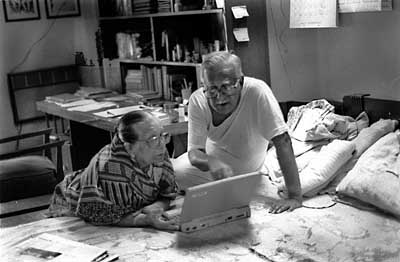
By Rahnuma Ahmed
[the relationship between class struggle and women?s liberation is] very close. Women were the first to be oppressed, and will be the last to be liberated when class oppression ceases. So the test of whether class oppression still exists is if women?s oppression still exists or not.
Comrade Parvati, central committee member and head of women?s department, Communist Party of Nepal (Maoist)
… communist men should know that the revolution and the gains of revolution can only be preserved and furthered when more and more women join and lead the revolution.
Comrade Parvati, CPN (M)
?IF YOU look at efforts to develop women?s leadership aimed at establishing equal relations between men and women, the party leadership seems to think that it is a waste of time. That women?s contribution will somehow be lesser. I don?t know how, through which process, they come to that conclusion. And the one or two women leaders like us, those who have managed to make it to the top, we are looked upon as exceptional. On some occasions, we are lauded, on others, condemned.?
I was talking to Moshrefa Mishu, president of the Garment Workers Unity Forum and convenor, Biplobi Oikko Front. In the twenty-five-plus years that I have known her, on the few occasions that we have met, nearly always we have fallen into each other?s arms and talked non-stop. About a whole lot of issues, garments workers wages, the mercilessly exploitative conditions under which they work, her party?s organisational work, the struggles of women workers as women, her own personal struggles, government persecution, the forty-odd cases against her. She has always been curious about my own work, what I am writing, what I am reading, and has always stressed the need to share ideas.
Mishu continued, there are many dedicated women, women who have ceaselessly devoted every living and thinking moment to the party, but they are not even central committee members. Look at the CPB (Communist Party of Bangladesh), Hena Das became a central committee member only when she was eighty. Or at Krishna di, she became a central committee member recently, in her sixties. Men? Oh, at a much younger age. Maybe at my age, I am forty-five now, in a few cases, even in their late-thirties. Do left women talk about these things, I asked. A bit, said Mishu. I remember, several months ago, Shireen apa (Shireen Akhter, joint general secretary, Jatiya Samajtantrik Dal) took Zaman bhai (Khalequzzaman Bhuiyan, Bangladesher Samajtantrik Dal) to task because Rousseau apa, Joly apa are not even central committee members. Even though they are such dedicated women, have tremendous leadership qualities and organisational capabilities. They are not even alternate members of the central committee. No woman has ever become a member of BSD central committee.
How do I dare to speak? Well, because I lead the Garment Workers Unity Forum, I work at the grassroots level. I am accepted. I think women comrades of other left parties, they might tell you one or two things but only off the record. Is it because of party loyalty, I interrupt. No, me, I am loyal too, I speak because I think it?s necessary. I think if they were to speak out they may well be suspended from the party. After all, how many heads does one have on one?s shoulders?
While transcribing Mishu?s interview, and in between breaks reading Comrade Parvati?s ?Women?s Leadership and the Revolution in Nepal?, these lines catch my eye. ?It is seen that revolutionary communist movements have always unleashed women?s fury, but they are not able to channelize this energy into producing enduring women communist leaders. The question has been raised again and again as to why there are so few women leaders in communist parties when Marxism offers such a deep penetrating analysis and solution to women?s oppression.?
This is Mishu?s question too, why are there are so few women leaders in the left movement in Bangladesh? What role have respective communist and socialist parties played in developing women leaders?
Where, I wonder, does one begin to seek answers?
?Women agitation?
The other day I was so shocked, says Mishu. Ganotantrik Bam Morcha, at present I am the co-ordinator, held a meeting to review a human chain programme organised to protest against the rise in prices of essentials. A young Morcha leader, personally I like him a lot, he is very modern in his outlook, said, ?photographers rush off to photograph Mishu apa. They want to present the protest as a ?women agitation?. I think we should be careful. We should keep an eye out for others, for senior leaders around us.?
I was truly shocked, said Mishu. I raised two questions: what do you mean by women agitation? Does that mean only men can, and should agitate, that women cannot? Even though women garment workers are a majority, even though most of our party members are women workers? Do you mean to say that these women should retreat to the back when men raise slogans, and should fall silent? You ask women to be present at the front of rallies, but when their photographs get taken, you become unhappy, you say, it becomes a women agitation. Of course, I am aware of the politics of media representation, of turning events into women events, but surely that is a separate issue.
Why does a woman leader?s photograph create problems, but not a male leader?s? Why is it that when photographers raise their cameras at me, I become a mere woman, that I am not a leader, like any other leader? Mishu added, I told them, I do not think of Tipu Biswas, or Comrade Khalequzzaman as ?men?, I think of them as my comrades. And anyway, how is it possible, amidst all that jostling, shoving and pushing, with the police coming down upon us, to keep an eye on who is where. I told them, unlike many other women comrades, I do not deny my womanness. Yes, of course, I am a woman. However, what intrigues me is why, and when, this gets raised as an issue.
Listening to Mishu, I think, so the left movement assumes that men are not gendered creatures. That men, by virtue of being men, have been able to rise above ?mere? gender concerns. That when they agitate, they do it on behalf of both men and women. That it is women who are particularistic, they can represent only other women. They alone are gendered. They alone are sexual beings. Familial beings.
Let me tell you of another incident, says Mishu. It happened when I was much, much younger. I was then president of the Chhatra Oikya Forum, the only woman president among forty or so student organisations. I was arrested, I was accused of possessing arms, and of attempted bank dacoity. A group belonging to the Sarbahara Party had been caught while committing dacoity at a petrol pump station in Gazipur, I had been publicly critical of that party, so when they were caught, they falsely implicated me. They said I had led the dacoity but had managed to escape by driving away in another car. Members of my student organisation, my sisters who were then new recruits to the party, had gone around asking left leaders to give a signed statement protesting my arrest, but they refused. They said, it was not a political matter. Nirmal Sen had wryly said, at least, we now have a woman dacoit in Bangladesh. My question is, how can my arrest, and the false cases not be political? Would they have uttered my name if I was a housewife? Some left members went to the extent of wondering aloud ? I know for sure because one of them, a woman leader later asked me ? were you romantically involved with any of the Sarbahara members? Did he implicate you because of an affair gone sour?
Listening to Mishu I think of Kalpana Chakma, a pahari leader, abducted by army personnel from her house in Marishya, twelve years ago. A similar story, that she was romantically involved with Lieutenant Ferdous, that she had eloped with him, had been spurn. That similar threads of reasoning, albeit a very gendered one, exist in discourses conducted by institutions one assumes to be poles apart, continues to amaze me.
Comrade in marriage
Comrade Parvati writes, women who have potential do not emerge as leaders of the revolution in Nepal because of the institution of marriage. The People?s War is changing the pattern but even within the PW, marriage and the decision to have children results in a lack of continuity of women?s leadership. Having children is a ?unilateral burden?, the birth of each new child brings greater domestic slavery. Communist women complain that ?having babies is like being under disciplinary action?, since they are cut off from party activities for long periods. Bright, aspiring communist women are lost to oblivion, even after marrying comrades of their choice. There is little support for women during their reproductive, child-bearing years. Women cadres are overtly or covertly pressurised into marrying since both men and women are ?suspicious? of a woman who is not married. Sexual offences, she says, are taken more seriously than political offences.
I ask Mishu, how have the social relations of marriage and sexuality impacted on women who belong to the left tradition in Bangladesh? And you yourself, you are single. Tell me, how have left women shaped and formed the project of women?s emancipation in their aspirations for bringing socialist change in Bangladesh.
What I have seen from my left student organisation days to now, at the Party level, women who are brilliant and beautiful, shundori and sharp, in the language of left men, are selected for marriage. The idea is, this will ensure that they will remain within the left. But, that is not necessarily the case, for they often disappear into domestic oblivion. I have also heard brilliant left men say, in cases where both comrades are equally qualified, have similar potential, both cannot be built up, one needs to be crucified. Well, adds Mishu with an impish smile, I myself have never seen men being crucified. Of course, people in the left always speak of the contributions of Jenny Marx, of Krupskaya, also of Leo Jogiches (Rosa Luxemburg’s comrade and lover). And I myself, I deeply respect and admire our male comrades, they have not sacrificed any less, they have endured, persevered against all odds, they are not lacking, it?s just their outlook, they are so terribly chauvinistic. Also, in a racist sense, you cannot imagine all the talk I overhear about forsha (fair) wives, and kalo (dark-skinned) wives.
Progressive men, communist men here, and I say this Rahnuma, in all seriousness, and with the utmost confidence, they do not practise equality between men and women in their personal lives. Neither towards their wives, nor their daughters, nor sisters. They emerge as korta (lord, master). I do not want to mention names, but daughters of left leaders have been known to be given away in marriage to good grooms, good meaning husbands with qualifications from abroad. I have discussed this with other women, and their experiences are similar. And what about party women who marry comrades, party leaders, I ask. Often, says Mishu, these women are new to the party, new to Marxist philosophy. In this situation, receiving a proposal and marrying so-and-so is perceived as bringing more status, greater prestige. They seem to form an elite by themselves.
What about the issue of sexuality? You are single, you have remained single, I return to an earlier thread of our conversation. This word is never ever mentioned, says Mishu. It is taboo. I have seen men sit and chat, they laugh among themselves, I can tell that they are talking about these things. I am sure if I had a couple of men friends, I would not have a leg to stand on in politics. There would be no space for me. After being released from jail, I hear the word ?sacrifice? being muttered, but I know there would be no space for me if I had lived differently. I would have liked it I had a male friend, of that I am sure. And what about male comrades, I ask. Is it different? But, of course, she replies. Many male comrades were single. It seems, they had women friends, but no one gossips about it. You mean their political image does not suffer as a result? No, says Mishu. You mean, in your case, they would call you characterless? Oh, absolutely. I wouldn?t be surprised if I were to be called a ?prostitute?. On hearing Mishu?s words, I wasn?t surprised either. As a university teacher, during the 1998 anti-rape movement on Jahangirnagar campus, an influential teacher who was furiously angry at my role in the movement had referred to me as a bessha. He had said it to another university teacher, who could not bring himself to repeat the word when he related the incident to me. Women are framed and located within a bou-bessha dichotomy, an everyday tool men use to whiplash female dissenters of patriarchy. Progressivist men dismiss it as ruchir obhab (tasteless), or nimno srenir bhasha (lower class language). The left cannot afford do it. The dichotomy itself is woven out of class-ed and gender-ed ideas. That, and its middle-class reception, both remain unexamined.
The left political tradition in Bangladesh, Mishu continues, is very masculine. That women can contribute to that tradition, both theoretically, and through their experiences as women, is something that is not seriously entertained. It is generally assumed that women can only inspire. They cannot lead. That women?s leadership can radically transform existing relations of power, this is not given any serious theoretical consideration. Men are considered to be theoretically superior. We women are adjuncts. That women?s participation, and women?s leadership can initiate changes in a masculine power structure, and that this is necessary, men in the left just do not give this any serious thought.
If we cannot create space to work together as comrades, if socialist aspirations for women are restricted to ?yes, we must do something for the women too?, if socialist ideals of equality are not practised at every level, in the party, in the family, in personal lives, in marriage, it will not happen automatically. If I raise these issues I am accused of being a neo-Marxist, of being a feminist, but what my Marxist comrades fail to realise is that this is essential for the creative development of Marxism. Her face suddenly breaks into a smile as she says, at least they no longer tell me, the masses won?t accept you. I work at the grassroots level, unlike many. I have no problems in gaining acceptance. And yes, did I tell you, women members are expected to wear mostly white saris. You mean dress like widows? Why on earth, I ask. We burst out laughing.
If I can?t dance, I don?t want to be part of your revolution, had said Emma Goldman, Lithuanian-born American international anarchist.
Women?s emancipation: a male script
Left men have created a framework. Women?s emancipation will have to be thought from within that framework. You will lead your life within that framework. If you do, you can preside at the next meeting. If not, regardless of the leadership qualities you may have, you cannot. I want to repeat, I respect my male comrades, I think very highly of them, they are not an oppressive lot, but I find it difficult to accept their framework of thoughts and ideas. Leaders of other parties will compliment me on my work, they will also expect me to seek advice from them, contrary to norms of party discipline. If I do so, I am a good woman, I mean an ideal woman leader. An ideal woman leader must be a good woman, as defined by dominant social norms. We are still expected to believe that once socialism is achieved, women will become emancipated. It will happen automatically. This is an over-simplification. If and when it does happen, we will advance only one step, women will gain a few rights. What will be achieved is macho socialism.
And what about women party members, I ask. I don?t think their experiences are very different. As newcomers, often they receive proposals. Such a situation may be upsetting. She may not like it. She may leave. She may become disillusioned. To say that women have to be strong enough to handle this, ignores the question of Party responsibility to tackle these issues head-on. To make creative space for women members. For those who are the party?s ?other?.
Our long conversation comes to an end. I am reminded of Russian revolutionary Alexandra Kollontai who had insisted that the emancipation of women requires not only the end of capitalism, but also a concerted effort to transform human interpersonal relations ? of sexuality, love and comradeship ? along with the struggle for social change.
============
First published in The New Age on Tuesday the 5th August 2008


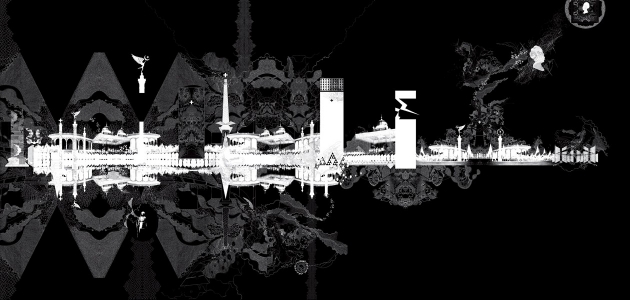



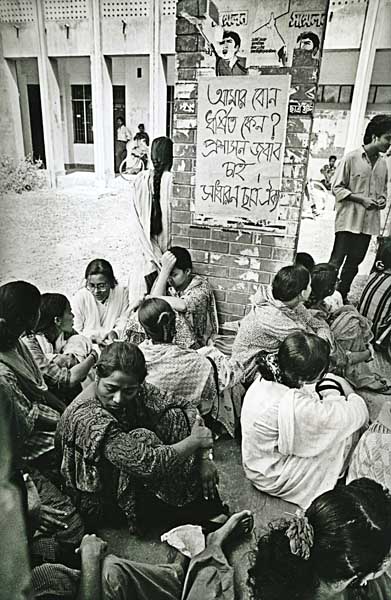
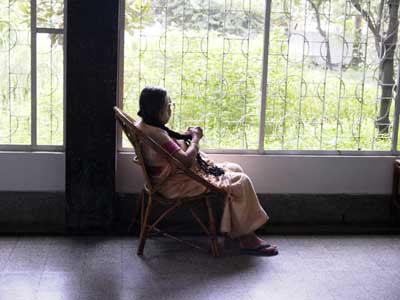
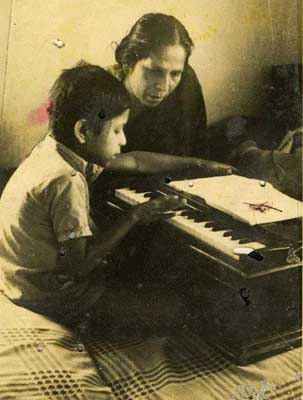
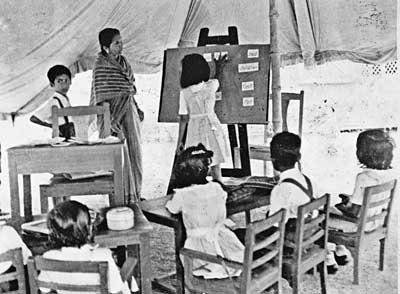
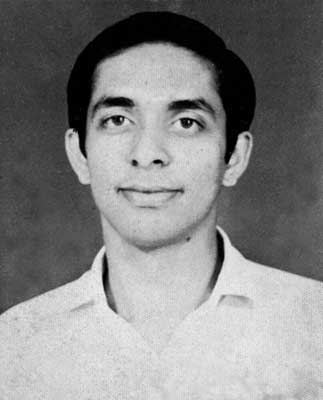
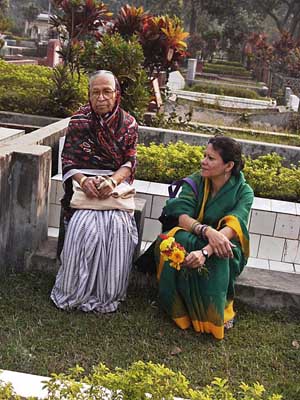
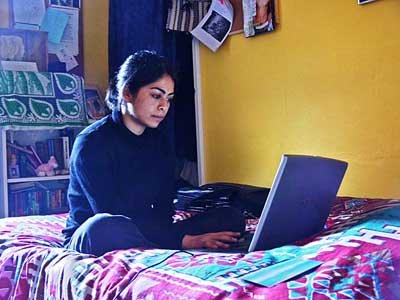
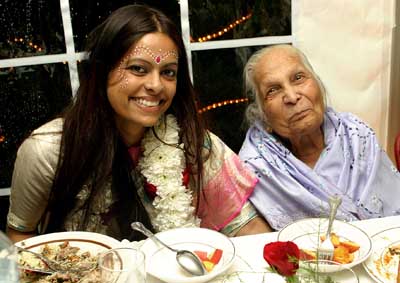 Amma at Sofia’s wedding
Amma at Sofia’s wedding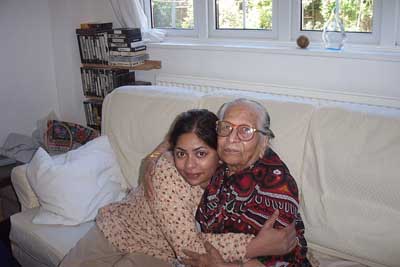
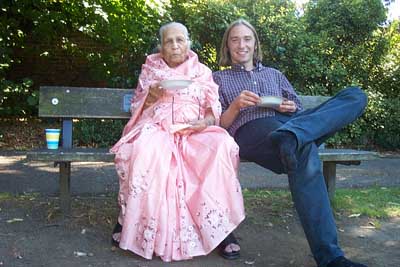 Amma and Sofia’s husband David
Amma and Sofia’s husband David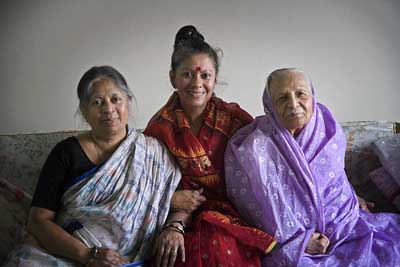
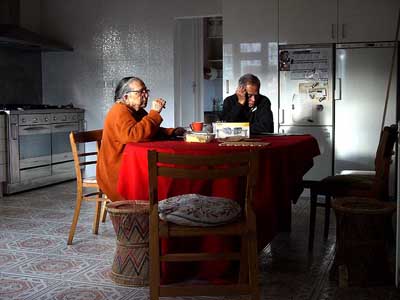 Amma and Dulabhai
Amma and Dulabhai